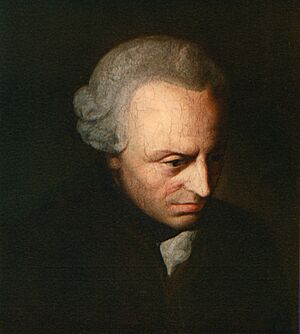Deontology facts for kids
In moral philosophy, deontological ethics or deontology is a way of thinking about what makes an action right or wrong. The main idea is that some actions are right or wrong based on a set of rules, not because of the results of the action. It is sometimes called "duty-based" or "rule-based" ethics.
The word deontology comes from the Greek words deon, meaning "duty" or "obligation," and -logia, meaning "study of." So, it is the "study of duty."
This way of thinking is different from other ideas like utilitarianism, which says an action is good if it creates the most happiness for the most people. In deontology, following the rules is more important than the outcome. For example, a deontologist might say that lying is always wrong, even if telling a lie could lead to a good result.
Depending on the specific system, these moral rules might come from different places. Some believe they are natural laws of the universe, while others believe they come from religious law or a person's own values.
Contents
Main Ideas in Deontology
There are several different ways to think about deontology. Here are some of the most famous ones.
Immanuel Kant's Idea of Duty

Immanuel Kant, a German philosopher, is one of the most famous figures in deontology. He had two main ideas:
- People should act out of duty.
- The motive behind an action is more important than the results of the action.
Kant believed that the only thing that is good without any doubt is a good will. A "good will" means wanting to do the right thing just because it is the right thing to do. Things like intelligence, courage, or happiness are good, but they can be used for bad purposes. For example, a smart person can use their intelligence to plan a crime. But a good will is always good, no matter what.
According to Kant, you have a good will when you act out of respect for the "moral law." This means you do something because you know it's your duty, not because you want to or because you hope for a good reward.
The Categorical Imperative
Kant created a famous test to figure out our moral duties, which he called the Categorical Imperative. It's a way to check if your motives are right. He described it in a few different ways:
- The Universal Law Rule: Act only in a way that you would be willing for it to become a universal law for everyone. Before you do something, ask yourself: "What if everyone in the world did this?" For example, if you consider making a promise you know you can't keep, imagine a world where everyone did that. In that world, promises would be meaningless. Therefore, you have a duty not to make false promises.
- The Humanity Rule: Treat all people, including yourself, as valuable and important, not just as tools to get what you want. This means you should not use people. For example, tricking someone into doing something for you is wrong because you are using them for your own goals without respecting them as a person.
Kant believed that some rules should never be broken. In one of his essays, he argued that lying is always wrong, no matter the situation. He wrote:
For a lie always harms another; if not some human being, then it nevertheless does harm to humanity in general, inasmuch as it vitiates the very source of right.
This means that even a small lie damages the idea of truth for everyone.
Divine Command Theory
Another type of deontology is the divine command theory. This is the belief that an action is right if God has said that it is right. People who follow this theory believe that moral duties come directly from the commands of a divine being.
According to this view, the reason to do the right thing is simply because God commanded it. For example, if a religion teaches that people should not work on a certain day, then not working on that day is the right thing to do because God commanded it. If a person doesn't work on that day just because they are feeling lazy, their action is not truly right in the moral sense.
This is different from Kant's idea because it says that the moral law comes from God, while Kant believed that humans, as rational beings, can figure out the moral law for themselves.
W.D. Ross and Having Many Duties
W. D. Ross, a Scottish philosopher, thought that Kant's single rule (the Categorical Imperative) was too simple. Ross argued that we have several different duties that we should try to follow. He called these prima facie duties, which means they are duties we should follow at "first glance."
Ross identified seven main duties:
- Fidelity: To keep your promises and tell the truth.
- Reparation: To make up for something you have done wrong.
- Gratitude: To be thankful and return kindness to others.
- Non-injury: To not harm other people.
- Beneficence: To do good and help others.
- Self-improvement: To work on making yourself a better person.
- Justice: To be fair in how you treat people.
What if Duties Conflict?
A problem can come up when two duties are in conflict. For example, what if you have to break a promise (violating the duty of fidelity) in order to help someone who is in trouble (following the duty of beneficence)?
Ross said that in these situations, we have to use our judgment to decide which duty is more important in that specific case. The duty that you must follow in a particular situation is called your absolute duty. So, while we have many general duties, we have to figure out our actual, absolute duty when we face a moral choice.
See also
 In Spanish: Deontología (ética) para niños
In Spanish: Deontología (ética) para niños

